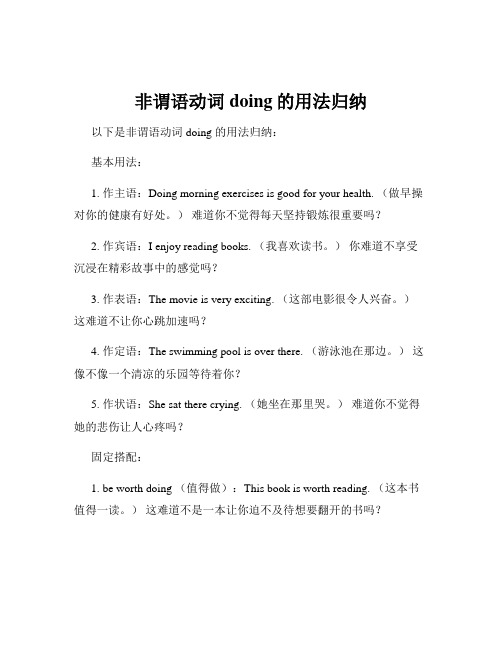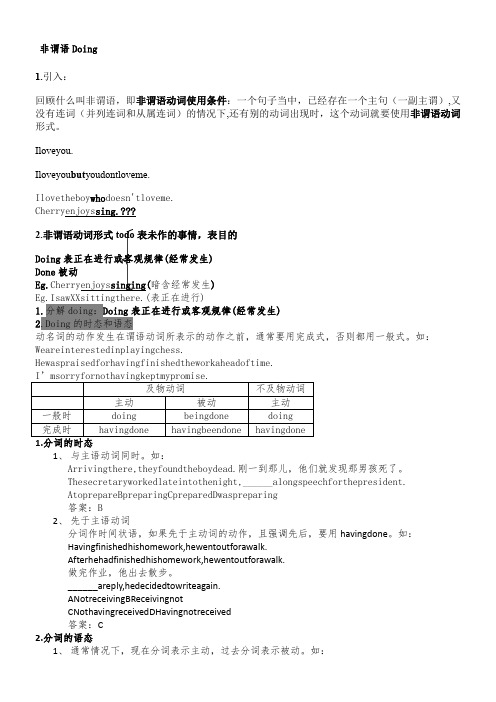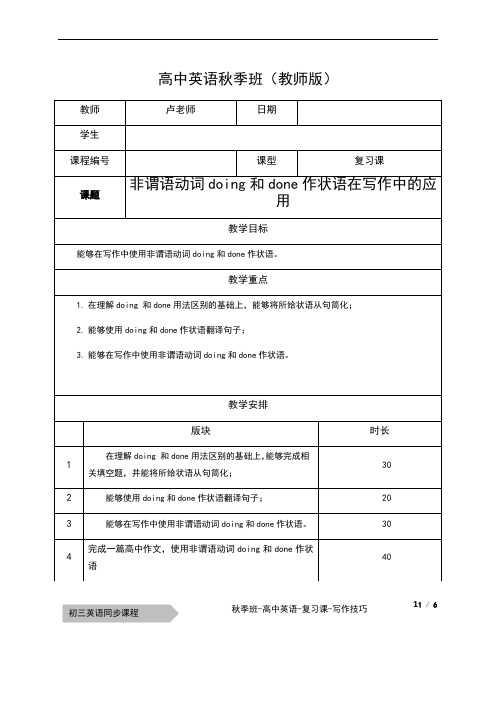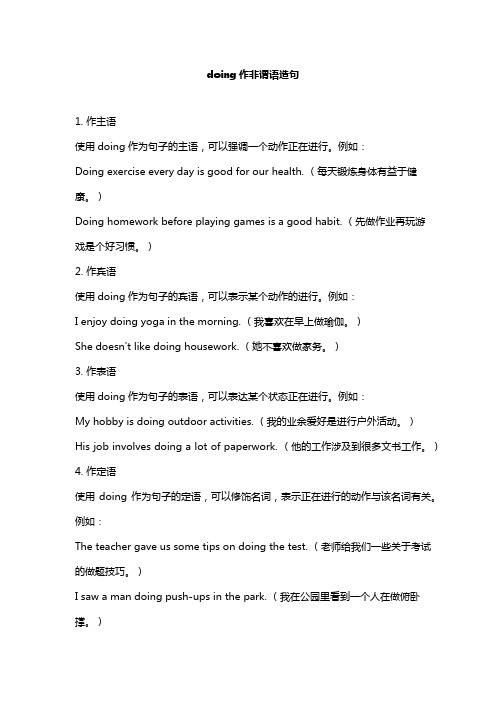非谓语动词doing
初中非谓语动词最全总结

初中非谓语动词最全总结1、动词:finish doing sth、完成做某事;enjoy doing sth、喜欢做某事;practice doing sth、练习做某事;imagine doing,想象做某事;avoid doing sth、避免做某事;consider doing sth、考虑做某事;suggest doing sth、建议做某事;mind doing sth、介意做某事; keep doing sth、持续做某事 allow 允许resist抵抗miss错过advise建议stand(忍受)risk冒险forgive escape admit2、固定短语:feel like doing sth、喜欢做某事;be busy doing sth、忙于做某事;be worth doing 值得做某事;spend time (in) doing sth、花费时间(金钱)做某事; havedifficult/trouble in doing sth做某事有困难;have fun doing或have a good/great time doing做某事高兴prevent…from d oing阻止be busy doing忙着做help sb with doingkeep on持续 put off推迟feel like想要3、介词后(on, in, of, about, at, with, without, for, from, up, by等)如:be good at doing sth、;thank you for doing sth、;give up doing sth、;stop sb、 from doing sth、;do well in doing sth、;be afraid of doing sth、;be interested in doing sth、;be proud of;instead of;be fond of4、to作介词的情况look forward to doing sth期望做某事; prefer doing sth、 to doing sth与…相比较更喜欢…;pay attention to doing注意做某事; be/get used to doing sth、习惯于做某事;make a contribution to为…做贡献lead to ,stick to, object to, get down to, on the/way to, as to关于。
非谓语动词doing的时态和语态

非谓语动词——doing (2)1.doing: 一般式表示的动作与谓语动词所表示的动作同时发生或在其前发生。
(When)Walking along the beach at dawn,you can enjoy the beautiful sunrise.The students rushed out , talking and laughing.Being ill, I can’t go to school .Not knowing his phone number , I can't get touch with him.2.having done: 完成式表示的动作发生在谓语动词所表示的动作之前。
The old lady forgot having paid for the goods.Though having lived abroad for years, many Chinese still observe the traditionalcustoms.Having suffered such heavy loss in the hurricane, the famers didn’t expect to have a good harvest. 3.being done/having been done: 被动形式表示doing和被修饰词或主语是被动关系。
being done 是正在被动的动作;having been done 是已经被动的动作。
Being interviewed by a repoter now, he can't answer your call.The man attended my birthday party without being invited.The building being built beside the playground will serve as our school gym.Having been beaten many times, she still didn’t give upNot having been invited to the party, Mary was greatly hurt.4、doing作插入语Generally speaking, Chinese is more difficult to learn than English.Judging from/by his accent, he must come from Canada.Considering his age, the boy did it quite well.Supposing it rains tomorrow,what shall we do?翻译练习1 He sat there, not daring to say a word.2 The man attended my birthday party without being invited.3 The kind girl ought to be praised instead of being criticized.4 Being watched by strangers now , I feel upset.5 I forgot having given her a call last night.6 The problem being discussed at the meeting is very important.7 Having found the cause,the doctors were able to treat the disease and cure it.8 Having suffered such heavy loss in the hurricane, the famers didn’t expect to have a good harvest.9 Though having lived abroad for years, many Chinese still observe the traditional customs.10 Not having received a reply, he wrote again to ask about what was going on.11 Not having completed the programme, we had to stay there for another two weeks.12 The storm left, having caused a lot of damage to the area.13 The old man, having been abroad for 20 years, is on the way to his homeland.14 Having been told many times , she finnally undstood it.15 Having been warned again and again, the student still w ouldn’t realize his mistake.16 Having been shown around the Ware Cube, we were taken to see the Bird’s Nest.17 Not having been invited to the party, the woman felt very unhappy.18 Not having been told the extra departure time, I missed the flight.19 Never having been praised by his teacher , the student gradually lost interest in study.20 For many older people, particularly those living alone or in the country, driving is important for preserving their independence, giving them the freedom to get out and about without having to rely on others.句意:对于很多老年人来说,特别是那些独自居住在乡间的老年人,驾驶对于保持他们(老年人)的独立性是非常重要的,这也给了他们出行而不用依赖他人的自由。
非谓语动词doing的用法归纳

非谓语动词doing的用法归纳以下是非谓语动词 doing 的用法归纳:基本用法:1. 作主语:Doing morning exercises is good for your health. (做早操对你的健康有好处。
)难道你不觉得每天坚持锻炼很重要吗?2. 作宾语:I enjoy reading books. (我喜欢读书。
)你难道不享受沉浸在精彩故事中的感觉吗?3. 作表语:The movie is very exciting. (这部电影很令人兴奋。
)这难道不让你心跳加速吗?4. 作定语:The swimming pool is over there. (游泳池在那边。
)这像不像一个清凉的乐园等待着你?5. 作状语:She sat there crying. (她坐在那里哭。
)难道你不觉得她的悲伤让人心疼吗?固定搭配:1. be worth doing (值得做):This book is worth reading. (这本书值得一读。
)这难道不是一本让你迫不及待想要翻开的书吗?2. can't help doing (禁不住做):I can't help laughing when I see that funny face. (当我看到那张滑稽的脸时,禁不住笑了。
)难道看到那样的脸你能忍住不笑?3. feel like doing (想要做):I feel like going for a walk. (我想去散步。
)难道你此刻不想出去走走,放松一下?4. have difficulty (in) doing (做……有困难):I have difficulty learning English. (我学英语有困难。
)难道学习一门新语言不是充满挑战的吗?5. be busy doing (忙于做):He is busy doing his homework. (他正忙于做家庭作业。
非谓语动词doing的用法总结

非谓语动词doing的用法总结
非谓语动词doing的用法总结如下:
1. 做主语:Doing exercises regularly helps improve physical fitness.
经常做运动有助于提高身体健康。
2. 做宾语:I enjoy doing yoga.
我喜欢做瑜伽。
3. 做定语:A living room is a place for doing various activities.
客厅是进行各种活动的地方。
4. 做补语:He kept on doing the same mistake.
他一直在犯着同样的错误。
5. 做状语:She left, doing her best to hide her tears.
她离开时,竭尽全力掩饰自己的眼泪。
6. 做同位语:Her favorite hobby, doing crossword puzzles, keeps her mind sharp.
她最喜欢的爱好——填字游戏,使她的头脑保持敏锐。
7. 做宾语补足语:We found him sitting alone in the park.
我们发现他独自坐在公园里。
总结:非谓语动词doing可以在句子中充当主语、宾语、定语、补语、状语、同位语以及宾语补足语的角色。
非谓语doing

非谓语Doing1.引入:回顾什么叫非谓语,即非谓语动词使用条件:一个句子当中,已经存在一个主句(一副主谓),又没有连词(并列连词和从属连词)的情况下,还有别的动词出现时,这个动词就要使用非谓语动词形式。
Iloveyou.Iloveyou but youdontloveme.Ilovetheboy who doesn'tloveme.Cherryenjoys sing.???2.非谓语动词形式todo表未作的事情,表目的Doing表正在进行或客观规律(经常发生)Done被动Eg.Cherryenjoys singing(暗含经常发生)Eg.IsawXXsittingthere.(表正在进行)1.分解doing:Doing表正在进行或客观规律(经常发生)2.Doing的时态和语态动名词的动作发生在谓语动词所表示的动作之前,通常要用完成式,否则都用一般式。
如:Weareinterestedinplayingchess.Hewaspraisedforhavingfinishedtheworkaheadoftime.I’msorryfornothavingkeptmypromise.及物动词不及物动词主动被动主动一般时doing beingdone doing完成时havingdone havingbeendone havingdone1.分词的时态1、与主语动词同时。
如:Arrivingthere,theyfoundtheboydead.刚一到那儿,他们就发现那男孩死了。
Thesecretaryworkedlateintothenight,______alongspeechforthepresident.AtoprepareBpreparingCpreparedDwaspreparing答案:B2、先于主语动词分词作时间状语,如果先于主动词的动作,且强调先后,要用havingdone。
如:Havingfinishedhishomework,hewentoutforawalk.Afterhehadfinishedhishomework,hewentoutforawalk.做完作业,他出去散步。
非谓语动词doing和done做状语的用法技巧

高中英语秋季班(教师版)11 / 6初三英语同步课程秋季班-高中英语-复习课-写作技巧22 / 6初三英语同步课程秋季班-高中英语-复习课-写作技巧v1.0 可编辑可修改33 / 6初三英语同步课程 秋季班-高中英语-复习课-写作技巧一、用动词的适当形式填空:非谓语动词作状语大多相当于一个状语从句A.作时间状语:eg.)①_______ (hear) the bad news, they couldn’t help crying.= _______________, they couldn’t help crying.②When/ While( _____ _____ ) ____ (take) around the city, we were deeply impressed by the city’s new look.While/When (I was) _____ (wander) through the square, I caught sight of a snake-charmer. ③_______ (finish) his work, he went home.=_____________, he went home.B.作原因状语:Eg.) ①_____ (be poor), he could not afford to travel abroad.=____________, he could not afford to travel abroad.________ (encourage) by his heroic deeds, they worked harder._______ (lose) in thought, he almost ran into a post.________ (frighten) by the big forest fire, the animals all ran away._____ (not know) her address, we couldn't get in touch with her.②______ (never be) to the city, he soon got lost._________ (not receive) his letter, I decided to call him up.知识点讲解=_____________.C.方式/伴随状语;Eg.)①She watched the film, _____ (weep ) and ___ (sigh).②The teacher stood there, ______ (surround) by a lot of students.D.作条件状语:Eg.)①______ (give) another chance, I would have done the job far better.=______________ , I would have done the job far better.②(If) _____ (play) all day, you will waste your valuable time.E.作结果状语:(意料中的结果)Eg.)① The hunters fired, _____(shoot) one of the wolves.②The bus was held up by the snowstorm, thus _____ (cause) the delay.区别: 不定式表示意外的结果eg.) He hurried to the station, only ____ (find) the train had left.F.作让步状语:Eg.)①Though ____ (rain) heavily, it cleared up very soon.= _____________, it cleared up very soon.②Though _____ (tell) of the danger, he still risked his life to save the boy.分词作状语时, 需注意事项:A.分词短语作状语时,它的逻辑主语通常应是________ :____ (see) from the hill, the city is beautiful.___ (see) from the hill, you can see the whole city二、使用doing和done简化以下状语从句:44 / 6初三英语同步课程秋季班-高中英语-复习课-写作技巧1.When arriving, send me a telegram. (When you arrive, send me a telegram.) 到达之后,来个电报。
doing作非谓语造句

doing作非谓语造句1. 作主语使用doing作为句子的主语,可以强调一个动作正在进行。
例如:Doing exercise every day is good for our health. (每天锻炼身体有益于健康。
)Doing homework before playing games is a good habit. (先做作业再玩游戏是个好习惯。
)2. 作宾语使用doing作为句子的宾语,可以表示某个动作的进行。
例如:I enjoy doing yoga in the morning. (我喜欢在早上做瑜伽。
)She doesn't like doing housework. (她不喜欢做家务。
)3. 作表语使用doing作为句子的表语,可以表达某个状态正在进行。
例如:My hobby is doing outdoor activities. (我的业余爱好是进行户外活动。
)His job involves doing a lot of paperwork. (他的工作涉及到很多文书工作。
)4. 作定语使用doing作为句子的定语,可以修饰名词,表示正在进行的动作与该名词有关。
例如:The teacher gave us some tips on doing the test. (老师给我们一些关于考试的做题技巧。
)I saw a man doing push-ups in the park. (我在公园里看到一个人在做俯卧撑。
)5. 作状语使用doing作为句子的状语,可以表示某个动作发生的同时正在进行的另一个动作。
例如:While watching TV, I was doing my homework. (我一边看电视,一边做作业。
)He burnt his hand while he was doing the cooking. (他在烹饪时烧伤了手。
)。
最新非谓语动词用法精讲-doing

5. Leave off ______(bite) your nails! 6. He didn’t feel like ______( work ), so he
suggested _____( spend ) the day in the garden. 7. You certainly mustn’t miss _______( see ) the
see the school library.
His not coming made everyone present very disappointed.
Seeing is believing. = To see is to believe.
It is no use crying over spilt milk. It‘s a waste of time arguing about it.
appreciate 感激 avoid 避免
keep 保持
consider 考虑
dislike 嫌恶
resist抵制
enjoy 喜欢
escape 避免
practice 练习
mind介意
feel like 意欲
finish 完成
include 包括
forgive 原谅
suggest 建议
miss 逃过
We remembered seeing the film. (=We remembered having seen the film.)
The question being discussed is very important. I can‘t stand being kept waiting. Having been shown the lab, we were taken to
- 1、下载文档前请自行甄别文档内容的完整性,平台不提供额外的编辑、内容补充、找答案等附加服务。
- 2、"仅部分预览"的文档,不可在线预览部分如存在完整性等问题,可反馈申请退款(可完整预览的文档不适用该条件!)。
- 3、如文档侵犯您的权益,请联系客服反馈,我们会尽快为您处理(人工客服工作时间:9:00-18:30)。
非谓语动词Ving一、非谓语动词的基本用法定义:在句子中充当除谓语以外的各种句子成分的动词形式叫做非谓语动词。
分类:1.不定式(主动/将来/具体/):He decided to work hard at English.2. -Ving形式2.1 动名词(主动/习惯/抽象):Learning is important to us.2.2 现在分词(主动/进行):We stood there, chatting.3.-ed 形式(过去分词) (被动/完成): The novel written by Mo Yan is very important.非谓语动词虽然不能充当谓语,但是可以充当除谓语动词以外的其他句子成分。
找出非谓语动词,并判断成分1. Making our city greener is everyone’s duty.2. The government is determined to continue the green program.3. I find my hometownchanged so much.4. Having fresh air, trees can reduce air pollution.5. Every effort to make the program makes a difference.动名词的形式:doing否定式:not + doing(1)一般式:常用来表示一个正在进行的主动的动作Do you know the man ______ (talk)to our headteacher?(2)一般式的被动式:被动语态-ing一般式所表示的动作是一个正在进行中的被动动作He came to the party without _______(invite).他未被邀请就来到了晚会。
(3)完成式:所表示的主动的动作发生在句中谓语动词所表示的动作之前(已经完成的主动的动作)_______ (finish) his work, he went to the party with joy.(4)完成被动式:表示被动的动作发生在句中谓语动词表示的动作之前(已经完成的被动的动作)_________ (show)around the lab, we were taken to see the library next.(5)否定式:not + 动名词I regret not following his advice. 我后悔没听他的劝告。
(6)复合结构:物主代词(或名词所有格)+ 动名词在-ing前加物主代词或名词所有格即构成-ing的复合结构。
其中的物主代词或名词所有格为-ing的逻辑主语。
He suggested our trying it once again. 他建议我们再试一次。
His not knowing English troubled him a lot. 他不懂英语给他带来许多麻烦。
1. 作主语:表示一般的、泛指的或习惯性的行为、经验用-ing形式;________ (read) aloud is very helpful. 朗读是很有好处的。
________(collect) stamps is interesting. 集邮很有趣。
当动名词短语作主语时也有用it作形式主语的,常见句式有:A:It’s no use/ no good/ a waste of time doingB: It’s nice/ fun/ useless/ worth doingEg. It's no use_________(quarrel) .争吵是没用的。
2. 作表语:①说明主语的具体内容②像puzzling, surprising, exciting等-ing分词表示“令人……的(事物)”;In the ant city, the queen's job is_____(lay) eggs. 在蚂蚁王国,蚁后的工作是产卵。
3. 作宾语:A:enjoy, finish, suggest, avoid(避免), excuse ,delay, imagine, keep, miss, consider, admit(承认),deny(否认), mind, permit, forbid, practice, risk(冒险), appreciate(感激), be busy, be worth, feel like, can't stand, can't help(情不自禁地)等词后B:在表示“需要”的need, want和require等后用-ing形式的主动形式表示被动意义,也可用不定式的被动式C:在介词之后用动名词作宾语。
think of, dream of, be fond of,, insist on, feel like, , be engaged in, spend…(in), succeed in注意to是介词的短语,如be /get used to, be accustomed to(习惯于), contribute … to …, devot e oneself to /be devoted to, get down to, look forward to, object to, pay attention to, make a contribution to doing (做贡献),pay attention to doing sth. (注意)D:含介词的固定句式:prevent /stop /keep sb. /sth. from doing 阻止……做……spend /waste time or money in doing 在做……方面花费/浪费时间或金钱have some difficulty/trouble in doing 在做……方面有些困难have a hard time in doing sth.做某事很艰难there is no+n.(sense/ use除了need之外) in doing做……是没有理由/道理的E. 复合结构做宾语物主代词/名词所有格+doingDo you mind my ______(open) the window?The rain prevents his _____(go) to school.Eg. They haven't finished ________( build) the dam. 他们还没有建好大坝。
We have to prevent the air from ________ ( pollute). 我们必须阻止空气被污染。
I am looking forward to _____ (meet) the students from America.When he realized he was in poor health, he finally decided to give up _____ (smoke).I really appreciate your_______ (help) me when I was in trouble.We should do what we can to prevent the earth ________ (become) too hot to live on.此外,动名词作宾语时,若跟有宾语补足语,则常用形式宾语it,例如:We found it no good making fun of others. 我们发现取笑他人不好。
有些动词可以加to do 不定式也可以加doing做宾语但是两者表示的意义不相同,对比:A: remember/ forget/ regret +to do / doingB: go on/stop+ to do/ doingC: try+ to do / doing4. 作定语:a.表示用途 b. 表示一个正在进行的主动的动作He can't walk without a __________(walk)stick. 他没有拐杖不能走路。
Do you know the girl ________ (stand) under the tree now?当分词单独做定语时,放在所修饰的名词前;如果是分词短语做定语放在名词后In the following years he worked even harder. 在后来的几年中,他学习更努力了。
The man speaking to the teacher is our monitor's father. 正与老师谈话的那个人是我们班长的父亲。
现在分词作定语相当于一个定语从句的句法功能,如:in the following years也可用in the years that followed; the man speaking to the teacher可改为the man who is speaking to the teacher.5. 作宾语补足语常跟在这些词see, watch, hear, feel, find, get, keep, notice, observe, listen to, look at, leave, catch之后如:see sb. doing sthEg. Can you hear her_______ (sing) the song in the next room? 你能听见她在隔壁唱歌吗?He kept the car _______(wait) at the gate. 他让小汽车在门口等着。
当宾语与作宾补的动词在逻辑上是主动关系时,用不定式(未来或全过程)或-ing形式(正在进行或一直处于某种状态);当宾语与作宾补的动词在逻辑上是被动关系时,用-ed形式。
另外,请注意复习以下6点:(1)在ask, invite, encourage, advise, forbid, remind等动词后,用带to的不定式作宾补。
(2)在help后作宾补的不定式带不带to均可。
(3)在make, let, have等使役动词和feel, smell, hear, see, watch等感官动词后,一般用不带to 的不定式作宾补,但在其被动式后作主语补足语时,要加上to。
(4)在with的宾语后,若用-ed形式,表示宾语与-ed形式在逻辑上是被动关系,且意味着该动作已经完成;若用-ing形式,表示宾语与-ing形式在逻辑上是主动关系,且表示动作持续进行。
